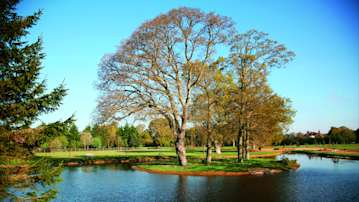
What will funerals look like in future?
Climate change is already affecting the way we live – many of us are switching to electric cars, taking fewer flights and recycling as much as possible. But what about the end of life? How can we hold environmentally friendly funerals too?
Recent research shows that concern for the environment is becoming a more important part of our funeral planning.
Many people are aware that eco-friendly funerals exist, but if you've not been to one yourself you could be left wondering what's involved and unsure about whether it's the right choice for you.

Eco-funerals of the future
Many people are aware of the term eco-friendly funerals, but if you've not been to one yourself you could be left wondering what's involved and unsure about whether it's the right choice for you. Eco-funerals of the future
As our interest in environmentally friendly funerals grows – and the global population also increases – what will green funerals look like in the future? How can we balance out our traditional plans for a final farewell with the need to save space and carbon emissions?
YouGov research, commissioned by Co-op Funeralcare, highlights that just under a third (29%) of UK consumers would choose alternative committal methods if available. Co-op Funeralcare are researching more sustainable funeral options to help clients make an informed decision when it comes to the environmental impact of arranging a funeral.
These 3 eco-friendly funeral trends are predicted to be among the most popular in the next few decades.
Resomation
Resomation, sometimes known as Alkaline Hydrolysis or Water Cremation, speeds up the natural process associated with burial.
__How does Resomation work? __
The body of the person who died is placed into a chamber. Pressurised water and a small amount of potassium hydroxide are added which speed up the natural process the body goes through at the end of life. Once Resomation is completed, the remains, a white ash-like powder, are then returned to the relatives.
YouGov research shows 89% of UK adults hadn’t heard of the term Resomation, once explained, just under a third (29%) said they would choose Resomation for their own funeral if it was available.
What are the benefits of Resomation?
It is believed that by using water in the process rather than flame, the environmental impact is reduced as the process releases no air emissions. Professor Douglas Davies from the Department of Theology and Religion, Durham University, said: “The reduced carbon footprint that may come with Resomation compared with other forms of body disposal, means it will no doubt be of interest to many people as the practise is increasingly made available in the UK.”
The growth of Resomation
Resomation is becoming increasingly popular in the USA, Canada, and South Africa. It could also be made available in Ireland this year. In January 2022 Archbishop Desmond Tutu was resomated in South Africa, bringing the process into the public eye.
17% of UK adults who have arranged a funeral in the last 5 years said they would have considered Resomation for their loved one’s funeral, had it been an option at the time.
Human composting
This is exactly what it sounds like; the body is broken down and turned into soil or compost. It’s placed into a coffin-like container with wood chips, alfalfa and straw, then pure oxygen is added to help microbes and natural bacteria break everything down. In 30 days, only nutrient-rich soil is left, which can then be used for growing trees or plants.
The method, also called recomposing or natural organic reduction, is already used to safely compost livestock. Recompose, are the only firm currently offering the service in America, say it’s very environmentally friendly as it stops up to 1.4 tonnes of carbon dioxide being released, compared with traditional cremation or burials, every time the service is used.
Funeral tree pods
You may have heard about woodland burials, but this idea takes things a step further. The body is placed into a large, egg-shaped ‘eco pod’ made from natural materials, and buried in the ground. A tree is then planted on top, using the nutrients to grow and become a lasting memorial to your loved one.
Tree pods are still in the planning stages but the designers hope they will one day transform traditional cemeteries into ‘vibrant woodlands, where families can stroll and learn about nature’. And what could be more eco-friendly than that?

Today’s green funeral choices
You don’t have to wait 20 or 30 years for a more environmentally friendly funeral. Apart from choosing a natural or woodland burial, there’s a number of tweaks you can make to a traditional celebration.
Why not go for a coffin created with sustainably managed raw materials, like willow, or an urn made from natural materials such as bamboo or banana leaves? You could also have an electric hearse – we’re starting to introduce electric and hybrid hearses to our fleet, and plan to phase out all fossil fuel vehicles over the next 10 years.
Whatever you decide to do, remember, the main goal is to help the environment.
Ask your funeral director for more eco-friendly funeral ideas, or help to arrange a natural burial. If you want advice on organising a personalised funeral, see our guides.


